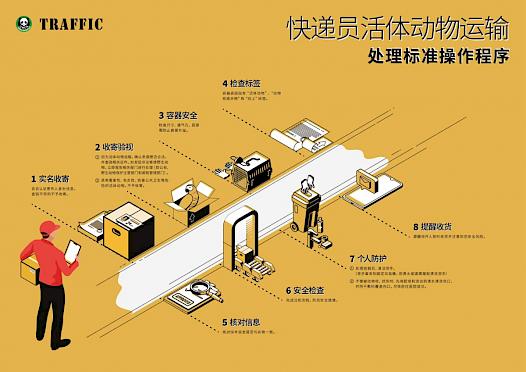Inspiring couriers to help stop illegal wildlife trade
In the latest TRAFFIC Social Behaviour Change campaign, a social media video features a ‘talking’ African Grey Parrot desperately needing help to save it from a wildlife trafficker. The video and accompanying poster aim to inspire couriers to become ‘heroes’ by reporting illegal wildlife trade.
First featured on China’s social media platform Douyin the video is part of a new social behaviour change campaign designed to curtail illegal wildlife trade (IWT) and mitigate the risk of zoonotic disease transmission in China’s postal industry.
Highlighting a scenario couriers may potentially find themselves in, the video and poster equip couriers with the knowledge to spot signs of illegal wildlife being traded and take action, as well as manage the transportation of wild animals safely and responsibly.
This campaign will arm courier and logistics companies professionals with the essential knowledge to tackle illegal wildlife trade vigorously while lowering the threats of zoonotic diseases. By raising awareness and entrenching best practices, it fortifies the transport sector’s commitment to responsible and sustainable practices."
Ling XU, Director of TRAFFIC China
Alongside the video, a poster outlines the processes for identifying live animals within packages, verifying their legality and what precautions need to be taken to prevent potential zoonotic disease risks.
 Download
DownloadThe video and poster align with the CITES Demand Reduction Guidance's structured Five-Step Approach, enriched by:
- insights from in-person interviews with 22 couriers in Guangxi and Yunnan provinces in April 2023;
- a comprehensive online survey completed by 1,500 couriers in July 2023;
- expert contribution from SBC specialists, as well as the National Forestry and Grassland Administration (NFGA), the State Post Bureau (SPB), the China Wildlife Conservation Association (CWCA) and the China Express Association (CEA).
This campaign expands upon previous collaborative milestones, including the 2015 "Zero Tolerance" declaration against IWT, a joint statement issued with the SPB, China’s CITES Management Authority (MA), the CEA, and 17 leading courier and logistics companies. It also follows the 2019 endorsement of the "Voluntary Code of Practice to Refuse Delivery of Illegal Wildlife and Products Thereof", signed by 14 prominent courier and logistics companies, including EMS, SF Express, STO Express DHL, FedEx and others.
The campaign debuted on Douyin, China’s leading social media platform in late June, aiming to reach key areas like Guangxi and Yunnan provinces, with an ambitious goal to engage 2 million individuals.
Notes:
This campaign was co-funded by the Critical Ecosystem Partnership Fund (CEPF) via Conservation International Foundation and the United States Agency for International Development (USAID) via International Union for Conservation of Nature (IUCN) under the Wildlife TRAPS project.
About CEPF

The Critical Ecosystem Partnership Fund (CEPF) enables civil society to protect the world’s biodiversity hotspots—biologically rich ecosystems that are essential to humanity, yet highly threatened. https://www.cepf.net/
About USAID

The United States Agency for International Development (USAID) is responsible for the majority of overseas development assistance from the United States Government and works to end extreme poverty and promote resilient, democratic societies while advancing security and prosperity for America and the world. www.usaid.gov/





